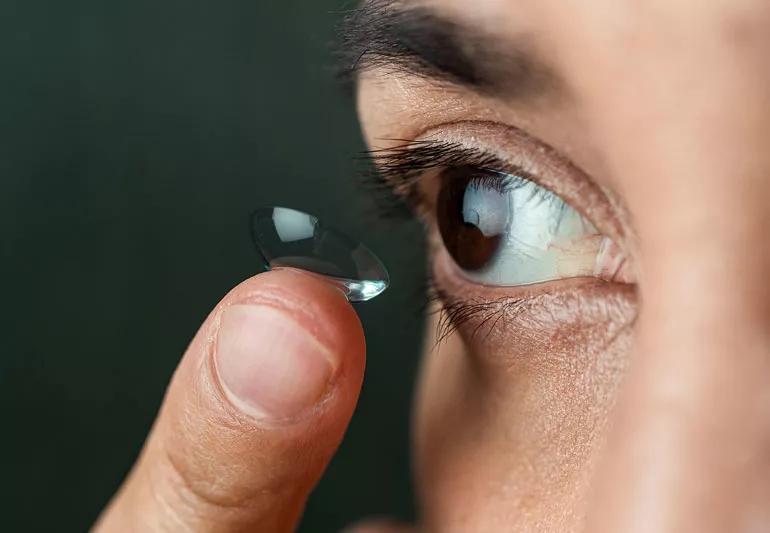The short answer from an ophthalmologist

Image content: This image is available to view online.
View image online (https://assets.clevelandclinic.org/transform/9bbc6817-edb4-47c8-ba5e-ac3115d2dd70/contactsCorona-MC-051720-770x533-1_jpg)
Man putting in contacts.
A: As far as we know, wearing contacts does not put someone at a greater risk of getting COVID-19. But good hygiene and proper contact use is especially important right now.
Advertisement
Cleveland Clinic is a non-profit academic medical center. Advertising on our site helps support our mission. We do not endorse non-Cleveland Clinic products or services. Policy
The coronavirus that causes COVID-19 is thought to enter the body through your eyes, nose and mouth. So, in theory, if your hands become contaminated with coronavirus and you touch your eyes, you could become infected. Since people who wear contact lenses tend to touch their eyes more often, that’s where the concern is.
It’s important for people who wear contact lenses to wash and dry their hands before putting in, taking out or otherwise handling their contacts.
Change, discard, disinfect and store your contact lenses as directed by the manufacturer and your eye doctor.
If you do find yourself rubbing your eyes frequently, consider switching to glasses. It’s also recommended that you stop using contacts if you become sick, especially with cold or flu symptoms.
Glasses may reduce face touching or eye rubbing, but there’s no evidence that they protect against COVID-19. They do protect against other types of infections, though.
Wearing contact lenses increases your risk of bacterial infections of the cornea (keratitis) that are unrelated to COVID-19 but can lead to permanent vision loss or blindness. Misusing contact lenses greatly increases that risk. So it’s also important to avoid:
Advertisement
— Ophthalmologist Craig See, MD
Advertisement

Sign up for our Health Essentials emails for expert guidance on nutrition, fitness, sleep, skin care and more.
Learn more about our editorial process.
Advertisement
Irritated eyes are just the beginning if you leave your contacts in too long
Contact lenses are available for virtually every prescription and lifestyle
Even contacts made for overnight use can hurt your eyes
The short answer from an optometrist
Redness, pain and blurred vision? See your doctor now
The short answer: It’s complicated, but the basic care precautions still prevail, like washing your hands and isolating if you’re sick
They can feel like a typical headache or a migraine headache, but the pain can last for weeks to months
Any large social gathering — from a family birthday party to an indoor music concert — has the potential to spread serious infection
Type 2 diabetes isn’t inevitable with these dietary changes
Applying a hot or cold compress can help with pain
Pump up your iron intake with foods like tuna, tofu and turkey